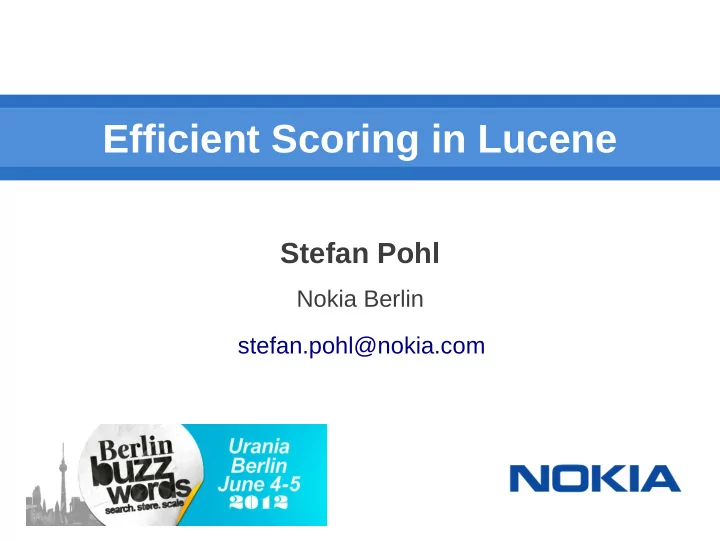

Efficient Scoring in Lucene Stefan Pohl Nokia Berlin stefan.pohl@nokia.com
Agenda Motivation Review: Query Processing Modes in Lucene Scoring Efficiency Optimization Experiments
Motivation Speed ! Human Reaction Time: 200 ms* → Backend latency: << 200 ms Load ? → Secs / Q ↓ means Q / secs ↑ Why not Scale Out ? → Costs * Steven C. Seow, Designing and Engineering Time: The Psychology of Time Perception in Software, Addison-Wesley Professional, 2008.
Ranked Retrieval in IR Engines Conceptually: → sort docs by score (descending) Technically:
Running Example Collection 24 900 500 docs, 1kB each, from English Wikipedia (used in Lucene's nightly benchmark: http://people.apache.org/~mikemccand/lucenebench ) Query: ”The Berlin Buzzwords Conference” 10 results queried Stats: Term t Doc. Freq. f t The 17,574,107 Berlin 100,989 Buzzwords 413 Conference 207,041
Conjunctions (AND) ”+The +Berlin +Buzzwords +Conference” → Matching requirement: All terms MUST* occur in result docs * see o.a.l.search.BooleanClause.Occur.MUST
Conjunctions (AND) ”+The +Berlin +Buzzwords +Conference”
Conjunctions (AND) ”+The +Berlin +Buzzwords +Conference” → advance(9) ...uses skip lists
Conjunctions (AND) ”+The +Berlin +Buzzwords +Conference” → advance(18)
Conjunctions (AND) ”+The +Berlin +Buzzwords +Conference” → advance(19)
Conjunctions (AND) ”+The +Berlin +Buzzwords +Conference” → advance(26)
Conjunctions (AND) ”+The +Berlin +Buzzwords +Conference” → advance(29)
Conjunctions (AND) ”+The +Berlin +Buzzwords +Conference” → advance(29)
Conjunctions (AND) ”+The +Berlin +Buzzwords +Conference” → advance(31)
Conjunctions (AND) ”+The +Berlin +Buzzwords +Conference” → advance(31)
Conjunctions (AND) ”+The +Berlin +Buzzwords +Conference” → advance(31)
Conjunctions (AND) ”+The +Berlin +Buzzwords +Conference” Result Set: {31,
Conjunctions (AND) ”+The +Berlin +Buzzwords +Conference” Result Set: {31}
Conjunctions (AND) ”+The +Berlin +Buzzwords +Conference” Few matches, only a few candidates to score Wikipedia 25M: 10 ms → Very efficient due to skipping , but 0 results → No partial match !
Disjunctions (OR) ”The Berlin Buzzwords Conference” → k-way merge (using min-heap over terms) * * see o.a.l.search.BooleanScorer2
Disjunctions (OR) ”The Berlin Buzzwords Conference” → next()
Disjunctions (OR) ”The Berlin Buzzwords Conference” → next()
Disjunctions (OR) ”The Berlin Buzzwords Conference” → next()
Disjunctions (OR) ”The Berlin Buzzwords Conference” → next()
Disjunctions (OR) ”The Berlin Buzzwords Conference” → next()
Disjunctions (OR) ”The Berlin Buzzwords Conference” → next()
Disjunctions (OR) ”The Berlin Buzzwords Conference” → next()
Disjunctions (OR) ”The Berlin Buzzwords Conference” → next()
Disjunctions (OR) ”The Berlin Buzzwords Conference” → next()
Disjunctions (OR) ”The Berlin Buzzwords Conference” → next()
Disjunctions (OR) ”The Berlin Buzzwords Conference” → next()
Disjunctions (OR) ”The Berlin Buzzwords Conference” → next()
Disjunctions (OR) ”The Berlin Buzzwords Conference” → next()
Disjunctions (OR) ”The Berlin Buzzwords Conference” → next()
Disjunctions (OR) ”The Berlin Buzzwords Conference” → next()
Disjunctions (OR) ”The Berlin Buzzwords Conference” No skipping ; all postings decompressed, merged & scores computed
Disjunctions (OR) ”The Berlin Buzzwords Conference” Wikipedia 25M: 750 ms , 17,628,190 totalHits (vs. 10 queried) → Scoring of almost ALL documents Can we do better?
Optimized Scoring with Maxscore* Maxscore* H. Turtle, J. Flood. Query Evaluation: Strategies and Optimizations , IPM, 31(6), 1995 . Maxscore Variants A. Z. Broder, D. Carmel, M. Herscovici, A. Soffer, J. Y. Zien. Efficient Query Evaluation using a Two-Level Retrieval Process , in Proc. of CIKM, 2003 . T. Strohman, H. Turtle, W. B. Croft. Optimization Strategies for Complex Queries , in Proc. of ACM SIGIR, 2005 . Maxscore for Block-Compressed Indexes K. Chakrabarti, S. Chaudhuri, V. Ganti. Interval-Based Pruning for Top-k Processing over Compressed Lists , in Proc. of ICDE, 2011 . Maxscore with Structured Queries S. Pohl, A. Moffat, J. Zobel. Efficient Extended Boolean Retrieval , IEEE TKDE, 24(6), 2012 .
Retrieval Model Scoring Functions Lucene's DefaultSimilarity: BM25: Scoring functions of (standard) retrieval models are SUMs over term score contributions
Maxscore → Order query terms by doc frequency f t → Box size refers to term score contribution
Maxscore → At indexing time, determine maxscore s*
Maxscore → At search time, compute cumulative maxscores c*
Maxscore → At search time, compute cumulative maxscores c*
Maxscore → At search time, compute cumulative maxscores c*
Maxscore → At search time, compute cumulative maxscores c*
Maxscore → Score top-k
Maxscore → Score top-k, track lowest score as threshold
Maxscore
Maxscore
Maxscore → Threshold exceeds c*
Maxscore → Merge m-1 terms, advance(16)
Maxscore → Threshold exceeds next c*
Maxscore → Merge m-2 terms, advance(29)
Maxscore – Experiments ”The Berlin Buzzwords Conference”: System Scored Docs Time [ms] Lucene40 17 628 190 750 ±11 Lucene40 w/ Maxscore 298 800 94 ± 3 8X speed up ! Hard queries from Lucene Benchmark: 2X 6.6X
Maxscore – Summary Most effective for: Large collections Queries w/ high-freq terms, or large result sets resp. Queries w/ many terms Benefits Exact (identical results) → easy testing, debugging Negligible overhead → never slower More expensive scoring fct. possible Caveats TotalHitCount → approximate, or say ”1000+” Have to decide on Similarity at indexing time
Conclusion DON'T BE AFRAID to score millions of docs. Follow and vote for LUCENE-4100 ! Thank you!
Recommend
More recommend